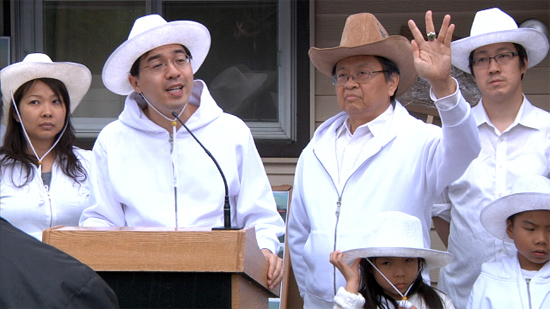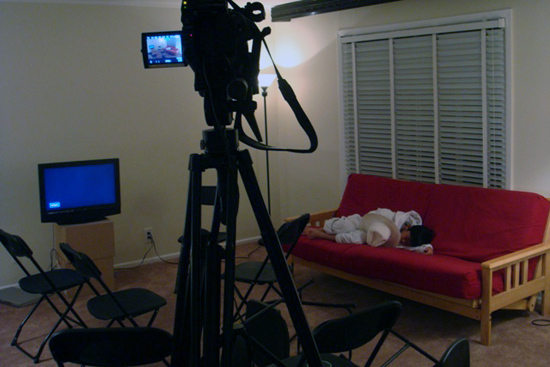We don’t want to repeat each other’s mistakes. We have to learn to admit what we’ve done wrong. And we have to share the lessons we’ve learned. We learn what to do better the next time, by fucking up famously the first time. Second films are rich terrain precisely for this reason. I would love to be in a room of filmmakers who just finished their second film just to harvest the sweet tidbits from the conversation.
Fortunately, recent sophomore feature grad, Preston Miller, shares today some of the morsels of knowledge he gathered his second time out.

by Preston Miller
GOD’s LAND, my second feature film, is an epic saga about a group of Taiwanese missionaries who travel to Texas to meet God as the world comes to an end. When I first came up with this project 8 years ago, my dream was to shoot the film in Taiwan and Texas with an all-star Asian cast and crew. But I had a limited budget and no real prospects but a dream. Through hell, high water and child rearin’, we got the film made. It has played at festivals in the US and screened by invitation in Europe. And this Friday it makes its premiere theatrically at the Quad Cinema in New York and online exclusively on Fandor.
Below are five or so principles that I used to make GOD’s LAND. As every experience is different these are what applied to mine. Take it for what you will.
Be original, DON’T do what you know. I believe the filmmaker Julie Dash said something to this effect. I was raised on National Geographic magazines growing up and personally I’m more interested and inspired by stories that are new to me, or at the very least a familiar story told in a unique way. I like to see people and locations that I’m not overly familiar with. In GOD’s LAND, we ‘experimented’ with a number of visual and story devices. I’m a huge cinephile and whenever I begin a new project, I think to myself, how can I create a film that no one has conceived of before, and also make it worthwhile to watch?
Also I try to come up with 5 – 10 visual ideas that I’ve never seen before. In GOD’s LAND there is a scene of eight-year-old Ollie (Matthew Chiu) watching live footage of a helicopter camera shooting his neighborhood on the TV news. When he recognizes his house he runs out to wave at the chopper and we see his tiny figure appear on the TV. He runs back inside to see if he can see himself and then tries again and again, a variation on the refrigerator door/light paradigm.

Use your assets. This is kind of a no-brainer but it’s easy to let your heart run away and get too intertwined with certain creative ideas. I wanted to fly the actors I have loved from Hou Hsiao-Hsien and Wong Kar Wai’s movies to Texas and have Christopher Doyle shoot our art-film, but that faded after investigating the cost of such an endeavor. So I mined the rich and underexposed talent of NYC based Asian and Asian-American actors for the cast and shot a good chunk of the film at my house on Long Island. It even looks like the actual neighborhood where the real story took place in Garland, Texas (minus the Levitt-houses.)
Stealing shots at the Jamaica train station and on the Newark Airport monorail also negated having to pay a local airport tens of thousands of dollars to shoot our airport scenes. Many other locations were simply asked for and due to our very small crew, access was granted. I used $15,000 of our own money to make this movie. I would have made it for ten million but I didn’t have it. I would have made it for $100,000 but I didn’t have that. If I only had $2000 to make this film, it would be made. It would most certainly be different. But it would be made!
Try to learn as much as you can about each position on the set. This way on micro-budget shoots, you can step in and work knowledgeably if a crew member is absent. I remember once working as a PA and asking an experienced crew member who was the best filmmaker he had ever worked for. He replied John Sayles because he could perform every function of every position on a set. As the captain of the ship he was able to communicate with his crew in a way that clearly got his ideas across because he knew what they had to do to make it happen. Also he writes and edits. This always stuck with me.
Many shooting days, due to lack of budget or scheduling conflicts, there were only one or two folks behind the camera on God’s Land. Over the last 15 years I can’t claim to be the best audio mixer or dolly grip, but I have asked enough questions and learned the tools of the trade to serve when called.
Create a productive and creative set environment. We accomplished this by keeping our 12-plus hour shooting days down to a minimum. By keeping our shooting schedule to 8 hrs or less we were able to approach each scene without feeling rushed and just trying to ‘get it in the can.’ Now, this wasn’t always the case (like shooting guerilla style in two Target stores) but generally my thoughts were to keep everyone fresh, supple and in a creative frame of mind.
Plus, working on a micro-budget we were free to take our time, not a luxury on a more well-moneyed film. We did have a shooting schedule and Jeremiah Kipp, our producer, kept us on track. Everyone was free to input their ideas and at least 5 crucial scenes were created on the set. We shot for a total of 25 days with 10 of those days as pick ups. We didn’t finish our scheduled day only twice. When shooting at my house, I barbequed on the grill for our meals. It was actually… fun!
Have a J-O-B that’s not dependent on the success of your micro-budget film. I am very fortunate to have a job that helps to feed, clothe and shelter my family that has nothing to do with my film. We squeak by OK and are by no means wealthy. I mirthlessly joke with my wife that making films is a second job, and it certainly is. I actually put more time into working on cinema than at my 9 to 5. The burdens it sometimes places on my family are not always kind or fair on my part. I am very lucky to have them as collaborators in these journeys.

Finish what you’ve started. Another filmmaker I met many years ago told me that you’re not a filmmaker until you’ve completed a film. Shoot and edit as long as you need but until you finish and screen, you’re still just ‘working on it.’ Don’t ever let the lack of money prevent you from finishing your film. Granted, good planning from pre- to post-production will certainly improve your chances.
Make your movie! Let nothing stop you! As of now, I create for the love of it. I do hope to make a living with this one day. I know I’m not going to get rich with this film. But it will allow me to make the next one and hopefully many more.
Watch GOD’s LAND October 28-30 online exclusively at Fandor (Note: Ted is on Fandor’s advisory board ) and at the Quad Cinema in New York City, opening October 28th.
Question for Preston?
Preston is giving a web-wide Q&A and YOU are the interviewer. Through Sunday, October 30, post questions for him on Fandor and he will attempt to answer you in a personal video post.
Preston Miller’s first feature JONES (2007) was critically praised by the likes of Amy Taubin in Film Comment. His second feature GOD’s LAND has been invited to play in Buffalo, Denver, Berlin and now opens in NYC. He lives with his family on Long Island though he proudly hails from NC.





